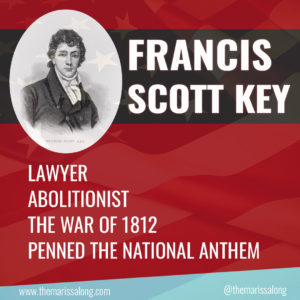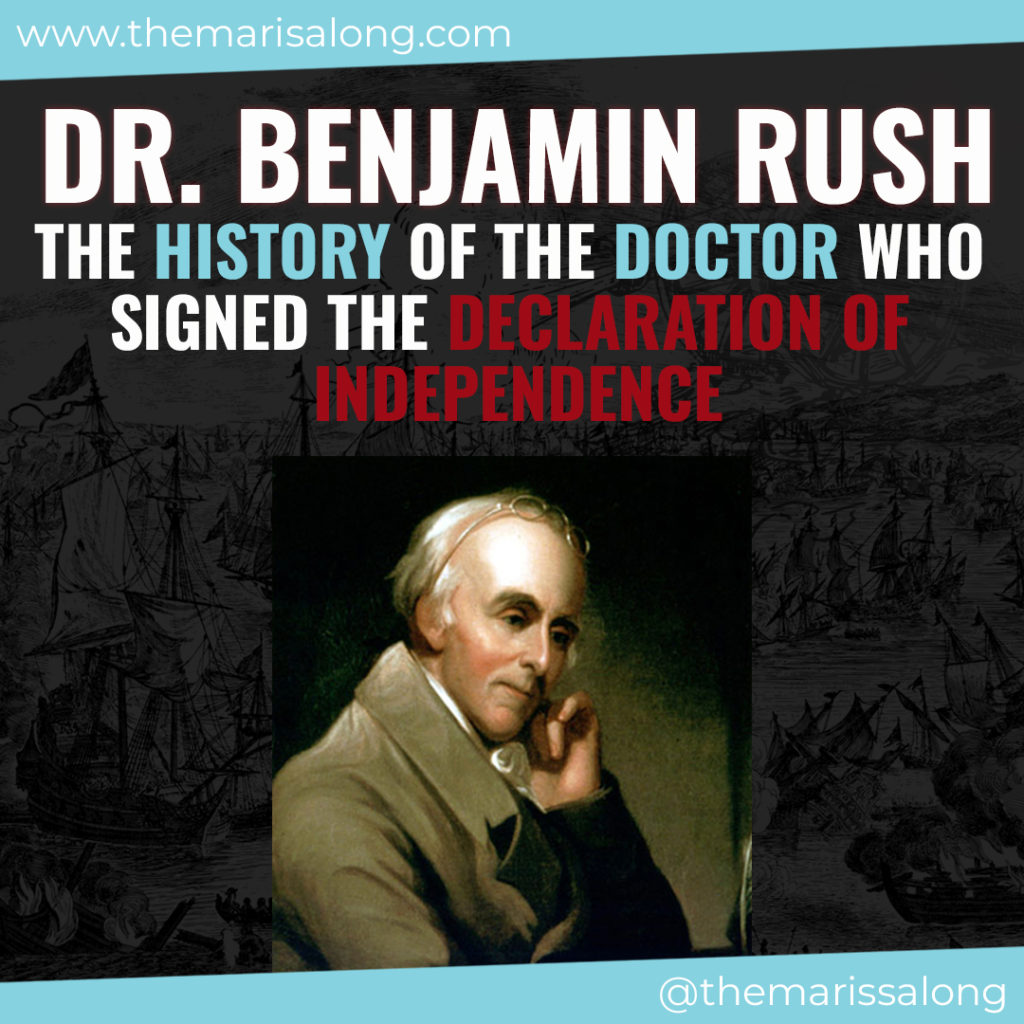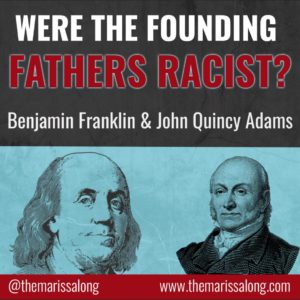Benjamin Rush is a well-known doctor during the American Revolution and signer of the Declaration of Independence. However, if you ask most young Americans, “Can you give me some Benjamin Rush facts?”, most of them couldn’t answer the question.
We want some Benjamin Rush facts, including his influence on Thomas Paine writing Common Sense, his amazing contributions to the medical field as a doctor, and his diplomatic abilities as he broke the silence between John Adams and Thomas Jefferson.
BENJAMIN RUSH FACTS: HIS YOUNG LIFE AND EDUCATION
A quick search on the internet yields multiple birth dates for Benjamin Rush. Biography claims he was born January 4, 1746, and (AmericanMinute uses O.S. January 4, 1745). Nonetheless, Benjamin Rush was born outside Philadelphia in Byberry Township. At 6 years old, Rush’s father died, and his uncle, Reverend Samuel Finley, took the young boy under his wing.
Reverend Samuel Finley later became president of the College of New Jersey (now Princeton University). Young Benjamin Rush studied law and graduated from the College of New Jersey with his B.A. in 1760 at 14 years old.
At this point, Rush moved to Philadelphia to train as a physician and was mentored by many of the best medical experts of the time, including John Redman and William Shippen Jr. Redman encouraged Rush to travel to Scotland to study medicine, and Rush graduated from the University of Edinburgh in 1768.
During Rush’s stay in Scotland, he was exposed to “the Scottish Enlightenment’s Common-Sense Realists, who believed fundamental principles can be taken for granted without needing to give a reason for them, […]” (Monticello). These beliefs would carry over into Rush’s influence during the American Revolution and the establishment of natural rights. The Scottish Realists also taught cutting-edge medical practices of the time, such as blood-letting and purging.
[insert natural rights]
Finally, in 1769, Rush returned to his homeland in Philadelphia and established his own medical practice. The College of Philadelphia appointed as chair of chemistry in their medical department, “making him the first professor of chemistry in America, at the young age of [approximately] 23” (Biography). He rubbed shoulders with the famous Benjamin Franklin.
It is important to note that although Rush’s medical practices seem “archaic”, he was affectionately called the “‘Father of American Medicine’ for his work on staff at the Pennsylvania Hospital, where he opened the first free medical clinic” (AmericanMinute).

Also Read: Francis Scott Key & The Star-Spangled Banner
BENJAMIN RUSH FACTS: THE CONTINENTAL CONGRESS
It didn’t take long as the 1770s dawned before every American had to make a choice: to defend freedom or to allow the British to tyrannize them. Benjamin Rush made his choice and had the honor of being selected as a delegate to the Continental Congress. He became life-long friends with many of the greats in American history, “including Thomas Jefferson and John Adams” (Monticello).
Benjamin Rush & Common Sense
The famous author Thomas Paine received advice from Benjamin Rush while writing his pamphlet Common Sense. This pamphlet, published in January 1776, stoked the embers of liberty in America’s heart, and not seven months later, America would declare independence from Britain.
Benjamin Rush Facts: Getting Married
During his time as a delegate to the Continental Congress, Rush reconnected with his acquaintance he had met in Scotland, Richard Stockon, also a delegate and signer of the Declaration of Independence. Rush married Stockton’s daughter, Julia, on January 11, 1776.
BENJAMIN RUSH FACTS: HIS CONTRIBUTIONS TO MEDICINE
Once the ink had dried on Rush’s signature on the Declaration of Independence, Rush joined the Continental Army as Surgeon-General of the Middle Department. During his service, Rush aided wounded soldiers during the Battle of Princeton and even tended to General Hugh Mercer.
When smallpox began to spread like wildfire through the American troops, “Dr. Rush personally inoculated Virginia Governor Patrick Henry against smallpox, as well as Pennsylvania troops, resulting in their low rate of illness” (AmericanMinute).
Rush criticized George Washington’s leadership as general, and he was forced to resign from Surgeon-General, after which he taught medicine at the University of Pennsylvania where he gained more experience and respect.
Rush “was among the first to recognize alcoholism as a disease and began to promote temperance” (AmericanMinute).
He penned the first mental illness and psychiatry textbook, “recommending treatment with kindness, earning him the title ‘Father of American Psychiatry’” (AmericanMinute).
Rush also aided in the founding of “Dickinson College to train physicians and the Philadelphia Dispensary” (AmericanMinute). His statue still stands on the Dickinson College campus as a memorial for his extensive contributions. It is estimated that Dr. Rush taught 3,000 medical students who went on to become doctors with established medical careers in America.
In 1793, as Yellow Fever ravaged thousands in Philadelphia, Dr. Rush courageously stayed in the city and “was the first to recognize that yellow fever was not contagious, leading to the later discovery that it was spread by mosquito bites” (AmericanMinute).
RELATED: Henry Knox: America’s Forgotten Revolutionary General
BENJAMIN RUSH FACTS: HIS CONTRIBUTIONS TO AMERICAN EDUCATION
Not only did Benjamin Rush teach medical students who would go on to shape American medicine, but he shaped American education in general. He was in favor of public education for young women (a radical idea for that time) and wrote in 1786 in Thoughts Upon the Mode of Education Proper in a Republic, “‘I proceed … to inquire what mode of education we shall adopt so as to secure to the state all of the advantages that are to be derived from the proper instruction of the youth; and here I beg leave to remark that the only foundation for a useful education in a republic is to be laid on the foundation of religion.
“…Tihgout this there can be no virtue, and without virtue there can be no liberty, and liberty is the object and life of all republican governments.
“But the religion I mean to recommend in this place is that of the New Testament… Its doctrines and precepts are calculated to promote the happiness of society and the safety and well-being of civil government” (AmericanMinute).
He strongly urged the reading of the Bible in American schools, writing in his essay “A Defense of the Use of the Bible as a School Book,” “The Bible, when not read in schools, is seldom read in any subsequent period of life…
“It should be read in our schools in preference to all other books from its containing the greatest portion of that kind of knowledge which is calculated to produce private and public temporal happiness” (AmericanMinute).
Rush went even further in Essays, Literary, Moral, and Philosophical in 1798 when he wrote, “I know there is an objection among many people to teaching children doctrines of any kind, because they are liable to be controverted. But let us not be wiser than our Maker.
“If moral precepts alone could have reformed mankind, the mission of the Son of God into all the world would have been unnecessary.
“The perfect morality of the Gospel rests upon the doctrine which, though often controverted, has never been refuted: I mean the vicarious life and death of the Son of God” (AmericanMinute).
Rush wrote, “’I have been alternately called an Aristocrat and a Democrat. I am neither. I am a Christocrat.
“’I believe all power…will always fail of producing order and happiness in the hands of man. He alone who created and redeemed man is qualified to govern him” (AmericanMinute).

Read More! Just the Facts About Douglas MacArthur
BENJAMIN RUSH’S MOST BELOVED CONTRIBUTION TO AMERICAN HISTORY
Rush not only shaped American education and medicine, but he broke the famous and painful silence between Thomas Jefferson and John Adams in 1812 by encouraging Adams to write to Jefferson.
BENJAMIN RUSH FACTS: THE LEWIS AND CLARK EXPEDITION
During Thomas Jefferson’s term as president, Rush gave Meriwether Lewis medical training to prepare him for the Lewis & Clark Expedition. Rush and Jefferson shared a love of science and learning that, when combined, facilitated a successful expedition of the Louisiana Purchase.
BENJAMIN RUSH FACTS: HIS VIEW ON SLAVERY
As with any political figure from America’s founding, Rush had a view on slavery. He wrote that slavery was as “repugnant to the Genius of Christianity” and “supported ending slavery prior to the Revolutionary War, forming a Society for the Abolition of Slavery” (AmericanMinute).
He further wrote that “claims of superiority of the whites over the blacks are founded alike in ignorance and inhumanity” (Monticello).
During a time when black people were viewed as an inferior “race”, Benjamin Rush contributed (along with George Washington) to Richard Allen, a notable black minister at the time, and his new church that he established.
Yet another black minister named Hary Hosier preached the sermon “The Barren Fig Tree” in 1781, and Dr. Rush praised it as the greatest sermon he had ever heard.
Were the Founding Fathers Racist? Read more to find out!
BENJAMIN RUSH FACTS: HIS END OF LIFE
Benjamin Rush was appointed Chairman of Medical Theory and Practice at the University of Pennsylvania in 1796 and was also appointed Treasurer of the U.S. Mint in 1797 and “held both these positions until his death” (Monticello).
Rush’s health began to decline rapidly by 1813, and he wrote a touching memo to Julia, his wife, during his final illness:
“My excellent wife, I must leave you, but God will take care of you.
“By the mystery of Thy holy incarnation;
“by Thy holy nativity;
“by Thy baptism, fasting, and temptation;
“By Thine agony and bloody sweat;
“By Thy cross and passion;
“by Thy precious death and burial;
By Thy glorious resurrection and ascension, and by the coming of the Holy Ghost, blessed Jesus, wash away all my impurities, and receive me into Thy everlasting kingdom” (AmericanMinute).
Dr. Benjamin Rush died in Philadelphia on April 19, 1813, of typhus fever. His wife, Julia, and their 13 children buried him at the Christ Church Burial Ground.
After his death, Thomas Jefferson and John Adams corresponded via letter – a testament to Rush’s healing work in their friendship- regarding their dear friend’s death.
Jefferson wrote on May 27, 1813, “Another of our friends of 76. Is gone, my dear Sir, another of the Co-signers of the independence of our country, and a better man, than Rush, could not have left us, more benevolent, more learned, of finer genius, or more honest, we too must go; and that ere long” (AmericanMinute).
“Adams replied to Jefferson:
“’I know of no Character living or dead who has done more real good in America’” (AmericanMinute).
Thus ends the great life of Dr. Benjamin Rush.


